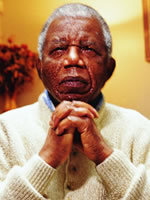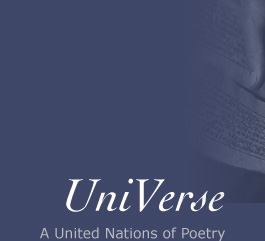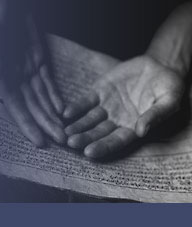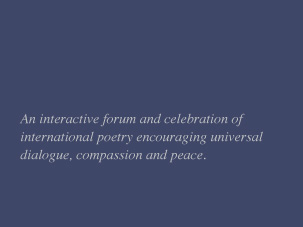| |
 |
 |
 |

Photo by Bob Wagner |
Chinua Achebe was born in Nigeria in 1930. He was raised in the large village of Ogidi, one of the first centers of Anglican missionary work in eastern Nigeria, and is a graduate of University College, Ibadan.
Cited in the London Sunday Times as one of the “1,000 Makers of the Twentieth Century” for defining “A modern African literature that was truly African” and thereby making “a major contribution to the world literature,” Chinua Achebe has published novels, short stories, essays and children’s books. He is often cited as a major influence by the upcoming generation of African writers including, Helon Habila, Tsitsi Dangarembga and Chimamanda Ngozi Adichie. His canonical first novel, Things Fall Apart (1958), provides a counter-narrative to colonial notions of Africa as a savage place devoid of culture before the arrival of the white man. While widening colonial definitions of culture and literarature, Mr. Achebe’s writing crackles with life through animated dialogue, laugh-out-loud humour and clever turns of phrase that bring together both Igbo and English words.
Mr. Achebe had an early career in radio that ended abruptly in 1966, when he left his post as director of external broadcasting in Nigeria during the national upheaval that led to the Biafran War. He was appointed senior research fellow at the University of Nigeria, Nsukka, and began lecturing widely abroad.
From 1972 to 1975, and again from 1987 to 1988, Mr. Achebe was professor of English at the University of Massachusetts, Amherst, and also taught for one year at the University of Connecticut, Storrs.
His volume of poetry Christmas in Biafra and Other Poems, written during the Biafran War, was the joint winner of the first Commonwealth Poetry Prize. Of his novels, Arrow of God won the New Statesman-Jock Campbell Award, and Anthills of Savannah was a finalist for the 1987 Booker Prize.
Mr. Achebe has received numerous honors from around the world, including the Honorary Fellowship of the American Academy of Arts and Letters and Foreign Honorary Membership of the American Academy of Arts and Sciences, as well as more than thirty honorary doctorates from universities in England, Scotland, the United States, Canada, Nigeria, and South Africa. He is also the recipient of Nigeria’s highest honor for intellectual achievement, the Nigerian National Order of Merit, and of Germany’s Friedenpreis des Deutschen Buchhandels for 2002. In June 2007, Mr. Achebe won the Man Booker International prize.
Mr. Achebe lives with his wife in Annandale-on-Hudson, New York where they teach at Bard College. They have four children and three grandchildren.
Poems permission of Chinua Achebe, from Collected Poems
© 1971, 1973, 2004 Chinua Achebe
|
 |
 |
English
version
Pine Tree in Spring
(for Leon Damas)
Pine tree
flag bearer
of green memory
across the breach of a desolate hour
Loyal tree
that stood guard
alone in austere emeraldry
over Nature’s recumbent standard
Pine tree
lost now in the shade
of traitors decked out flamboyantly
marching back unabashed to the colors they betrayed
Fine tree
erect and trustworthy
what school can teach me
your silent, stubborn fidelity?
|
English
version
The First Shot
That lone rifle-shot anonymous
in the dark striding chest-high
through a nervous suburb at the break
of our season of thunders will yet
steep its flight and lodge
more firmly than the greater noises
ahead in the forehead of memory.
|
 |
 |
English
version
A Mother in a Refugee Camp
No Madonna and Child could touch
Her tenderness for a son
She soon would have to forget. . . .
The air was heavy with odors of diarrhea,
Of unwashed children with washed-out ribs
And dried-up bottoms waddling in labored steps
Behind blown-empty bellies. Other mothers there
Had long ceased to care, but not this one:
She held a ghost-smile between her teeth,
And in her eyes the memory
Of a mother’s pride. . . .She had bathed him
And rubbed him down with bare palms.
She took from their bundle of possessions
A broken comb and combed
The rust-colored hair left on his skull
And then—humming in her eyes—began carefully to part it.
In their former life this was perhaps
A little daily act of no consequence
Before his breakfast and school; now she did it
Like putting flowers on a tiny grave.
|
 |
 |
English
version
A Wake for Okigbo
For whom are we searching?
For whom are we searching?
For Okigbo we are searching!
Nzomalizo!
Has he gone for firewood, let him return.
Has he gone to fetch water, let him return.
Has he gone to the marketplace, let him return.
For Okigbo we are searching!
Nzomalizo!
For whom are we searching?
For whom are we searching?
For Okigbo we are searching!
Nzomalizo!
Has he gone for firewood, may Ugboko not take him.
Has he gone to the stream, may Iyi not swallow him!
Has he gone to the market, then keep from him you
Tumult of the marketplace!
Has he gone to battle,
Please Ogbonuke step aside for him!
For Okigbo we are searching!
Nzomalizo!
They bring home a dance, who is to dance it for us?
They bring home a war, who will fight it for us?
The one we call repeatedly,
there’s something he alone can do
It is Okigbo we are calling!
Nzomalizo!
Witness the dance, how it arrives
The war, how it has broken out
But the caller of the dance is nowhere to be found
The brave one in battle is nowhere in sight!
Do you not see now that whom we call again
And again, there is something he alone can do?
It is Okigbo we are calling!
Nzomalizo!
The dance ends abruptly
The spirit dancers fold their dance and depart in midday
Rain soaks the stalwart, soaks the two-sided drum!
The flute is broken that elevates the spirit
The music pot shattered that accompanies the leg in
its measure
Brave one of my blood!
Brave one of Igbo land!
Brave one in the middle of so much blood!
Owner of riches in the dwelling place of spirit
Okigbo is the one I am calling!
Nzomalizo!
In memory of the poet Christopher Okigbo (1932-1967)
Translated from the Igbo by Ifeanyi Menkiti
|
 |
 |
English
version
Dereliction
I quit the carved stool
in my father’s hut to the swelling
chant of saber-tooth termites
raising in the pith of its wood
a white-bellied stalagmite
Where does a runner go
whose oily grip drops
the baton handed by the faithful one
in a hard, merciless race? Or
the priestly elder who barters
for the curio collector’s head
of tobacco the holy staff
of his people?
Let them try the land
where the sea retreats
Let them try the land
where the sea retreats
|
|
 |
|





